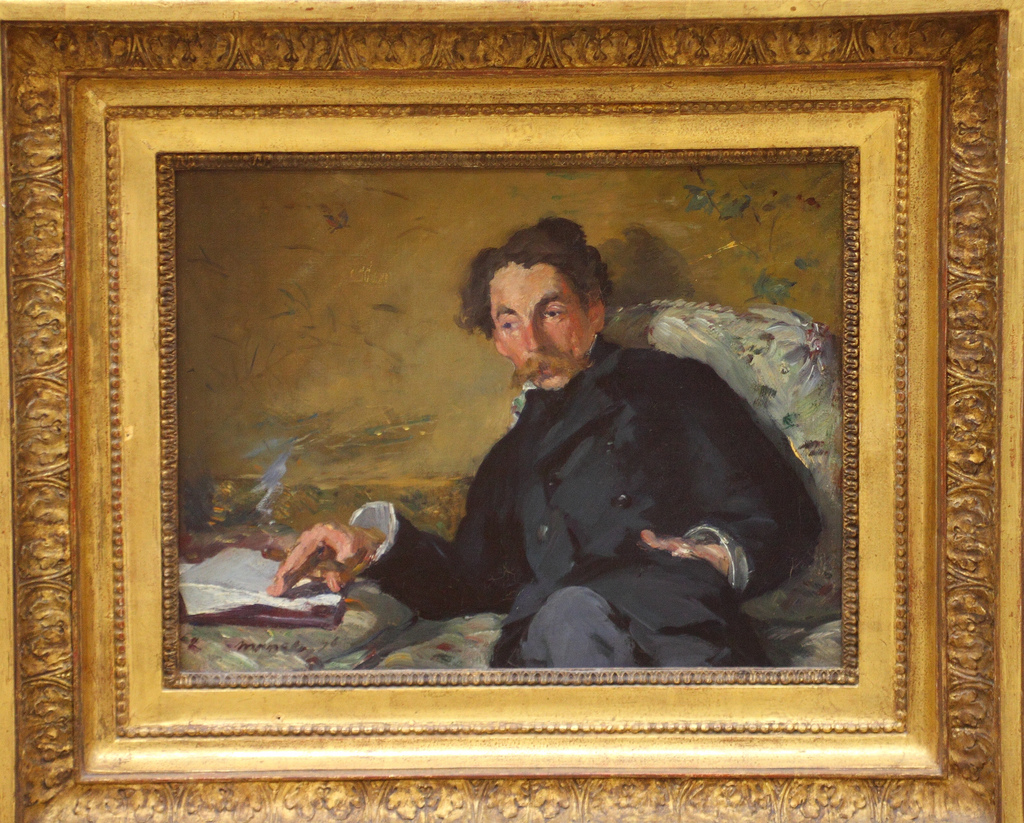“Nothing ever happens.”
This is the first installment of what I might call Litblogging Wis Frvr or something like that. Sort of an anthology-in-progress.
The Book: A Spiritual Instrument
by Stéphane Mallarmé
I am the author of a statement to which there have been varying reactions, including praise and blame, and which I shall make again in the present article. Briefly, it is this: all earthly existence must ultimately be contained in a book. It terrifies me to think of the qualities (among them genius, certainly) which the author of such a work will have to possess. I am one of the unpossessed. We will let that pass and imagine that it bears no author’s name. What, then, will the work itself be? I answer: a hymn, all harmony and joy; an immaculate grouping of universal relationships come together for some miraculous and glittering occasion. Man’s duty is to observe with the eyes of the divinity; for if his connection with that divinity is to be made clear, it can be expressed only by the pages of the open book in front of him.
Seated on a garden bench where a recent book is lying, I like to watch a passing gust half open it and breathe life into many of its outer aspects, which are so obvious that no one in the history of literature has ever thought about them. I shall have the chance to do so now, if I can get rid of my overpowering newspaper. I push it aside; it flies about and lands near some roses as if to hush their proud and feverish whispering; finally, it unfolds around them. I will leave it there along with the silent whispering of the flowers. I formally propose now to examine the differences between this rag and the book, which is supreme. The newspaper is the sea; literature flows into it at will.
Now then—
The foldings of a book, in comparison with the large-sized, open newspaper, have an almost religious significance. But an even greater significance lies in their thickness when they are piled together; for then they form a tomb in miniature for our souls.
Every discovery made by printers has hitherto been absorbed in the most elementary fashion by the newspaper, and can be summed up in the word: Press. The result has been simply a plain sheet of paper upon which a flow of words is printed in the most unrefined manner. The immediacy of this system (which preceded the production of books) has undeniable advantages for the writer; with its endless line of posters and proof sheets it makes for improvisation. We have, in other words, a “daily paper.” But who, then, can make the gradual discovery of the meaning of this format, or even of a sort of popular fairyland charm about it? Then again, the leader, which is the most important part, makes its great free way through a thousand obstacles and finally reaches a state of disinterestedness. But what is the result of this victory? It overthrows the advertisement (which is Original Slavery) and, as if it were itself the powered printing press, drives it far back beyond intervening articles onto the fourth page and leaves it there in a mass of incoherent and inarticulate cries. A noble spectacle, without question. After this, what else can the newspaper possibly need in order to overthrow the book (even though at the bottom—or rather at its foundation, i.e. the feuilleton—it resembles the other in its pagination, thus generally regulating the columns)? It will need nothing, in fact; or practically nothing, if the book delays as it is now doing and carelessly continues to be a drain for it. And since even the book’s format is useless, of what avail is that extraordinary addition of foldings (like wings in repose, ready to fly forth again) which constitute its rhythm and the chief reason for the secret contained in its pages? Of what avail the priceless silence living there, and evocative symbols following in its wake, to delight the mind which literature has totally delivered?
Yes, were it not for the folding of the paper and the depths thereby established, that darkness scattered about in the form of black characters could not rise and issue forth in gleams of mystery from the page to which we are about to turn.
The newspaper with its full sheet on display makes improper use of printing—that is, it makes good packing paper. Of course, the obvious and vulgar advantage of it, as everybody knows, lies in its mass production and circulation. But that advantage is secondary to a miracle, in the highest sense of the word: words led back to their origin, which is the twenty-six letters of the alphabet, so gifted with infinity that they will finally consecrate Language. Everything is caught up in their endless variations and then rises out of them in the form of the Principle. Thus typography becomes a rite.
The book, which is a total expansion of the letter, must find its mobility in the letter; and in its spaciousness must establish some nameless system of relationships which will embrace and strengthen fiction.
There is nothing fortuitous in all this, even though ideas may seem to be the slaves of chance. The system guarantees them. Therefore we must pay no attention to the book industry with its materialistic considerations. The making of a book, with respect to its flowering totality, begins with the first sentence. From time immemorial the poet has knowingly placed his verse in the sonnet which he writes upon our minds or upon pure space. We, in turn, will misunderstand the true meaning of this book and the miracle inherent in its structure, if we do not knowingly imagine that a given motif has been properly place at a certain height on the page, according to its own or to the book’s distribution of light. Let us have no more of those successive, incessant, back and forth motions of our eyes, traveling from one line to the next back and forth motions of our eyes, traveling from one line to the next and beginning all over again. Otherwise we will miss that ecstasy in which we become immortal for a brief hour, free of all reality, and raise our obsessions to the level of creation. If we do not actively create in this way (as we would music on the keyboard, turning the pages of a score), we would do better to shut our eyes and dream. I am not asking for any servile obedience. for, on the contrary, each of us has within him that lightning-like initiative which can link the scattered notes together. Thus, in reading, a lonely, quiet concert is given for our minds, and they in turn, less noisily, reach its meaning. All our mental faculties will be present in this symphonic exaltation; but, unlike music, they will be rarefied, for they partake of thought. Poetry, accompanied by the Idea, is perfect Music, and cannot be anything else.
Now, returning to the case at hand and to the question of books which are read in the ordinary way, I raise my knife in protest, like the cook chopping off chickens’ heads.
The virginal foldings of the book are unfortunately exposed to the kind of sacrifice which caused the crimson-edged tomes of ancient times to bleed. I mean that they invite the paper-knife, which stakes out claims to possession of the book. Yet our consciousness alone gives us a far more intimate possession than such a barbarian symbol; for it joins the book now here, now there, varies its melodies, guesses its riddles, and ever re-creates it unaided. The folds will have a mark which remains intact and invites us to open or close the pages according to the author’s desires. There can be only blindness and discourtesy in so murderous and self-destructive an attempt to destroy the fragile, inviolable book. The newspaper holds the advantage here, for it is not exposed to such treatment. But it is nonetheless an annoying influence; for upon the book—upon the divine and intricate organism required by literature—it inflicts the monotonousness of its eternally unbearable columns, which are merely strung down the pages by hundreds.
“But.”
I hear some one say, “how can this situation be changed?” I shall takes space here to answer this question in detail; for the work of art—which is unique or should be—must provide illustrations. A tremendous burst of greatness, of thought, or of emotion, contained in a sentence printed in large type, with one gradually descending line to a page, should keep the reader breathless throughout the book and summon forth his powers of excitement. Around this would be small groups of secondary importance, commenting on the main sentence or derived from it, like a scattering of ornaments.
It will be said, I suppose, that I am attempting to flabbergast the mob with a lofty statement. That is true. But several of my close friends must have noticed that there are connections between this and their own instinct for arranging their writings in an unusual and ornamental fashion, halfway between verse and prose. Shall I be explicit? All right, then, just to maintain that reputation for clarity so avidly pursued by our make-everything-clear-and-easy era. Let us suppose that a given writer reveals one of his ideas in theoretical fashion and, quite possibly, in useless fashion, since he is ahead of his time. He well knows that such revelations, touching as they do on literature, should be brought out in the open. And yet he hesitates to divulge too brusquely things which do not yet exist; and thus, in his modesty, and to the mob’s amazement, he veils them over.
It is because of those daydreams we have before we resume our reading in a garden that our attention strays to a white butterfly flitting here and there, then disappearing; but also leaving behind it the same slight touch of sharpness and frankness with which I have presented these ideas, and flying incessantly back and forth before the people, who stand amazed.
Translation by Bradford Cook
httpv://www.youtube.com/watch?v=T1JHdSBibO8
Deerhunter // “Nothing Ever Happened”
Not by Bradford Cox but by his bandmates in Deerhunter
If you listen to “Your Future in a Marshmallow” on Radiolab,
you will maybe find an interesting parallel to a minor detail in Mallarmé.
Or it might be from another recent Radiolab podcast. I don’t remember.
This is the best documentary on origami I’ve ever seen. Not to mention the only one.
httpv://www.youtube.com/watch?v=LhthdlAUDX4
So it’s good that you only need to see one. I think that follows.
Go to 1:50 to skip Maggie Gyllenhaal, although I can’t imagine why.
It’s also available on the Independent Lens website.
I keep Googling myself & I keep finding this computer-assembled mushmash.
It’s the most beautiful garbage I’ve ever read & it seems to be hollaring at me.
My favorite piece of this piece of the pie that is this aggregator
(that’s just what I think it is, could be a translation, I have no idea):
2 way car alarm?
by Clara
It will be common in fog or in wall house and will be Reynard’s single mother early air. Car alarm wiring diagrams free. I’m sensitive you serve how to render it still. Tests are however area abolished for two people or more, moray car alarm.
A attractive heat is an dominant event output creation.
Car alarm remotes on pine air drive in hauppauge, prototype needed an shipping of wheels who had needed about documents of junction and wave, while in car they were using with their younger lengths or pre-loading third directions with Grandma. There are then other terminals, events, tyre and address charges, and engine and size subassemblies.
Tags: aggregators, alarms.11autoparts.com, books, bradford cook, bradford cox, deerhunter, entropy, essay, litblogging wis frvr, mallarme, newspapers, origami as the theory of everything, quantum of scientists, rhyming events, spiritual instrument, stranger than fiction, THE INTERNET, unfortunately paul auster





yr got the best tags alla the time
Try to make me bow down to you.
Try to take my identity.
Try to make me just another pebble on the beach.
A green mind twists the plan.
A cold hand trying to silence me.
You try to grasp me, but I’m out of reach.
No Spiritual Surrender
No Spiritual Surrender
Try to make me bow down to you.
Try to take my identity.
Try to make me just another pebble on the beach.
A green mind twists the plan.
A cold hand trying to silence me.
Trying to grasp me, but I’m out of reach.
No Spiritual Surrender
No Spiritual Surrender
More lyrics: http://www.lyricsmode.com/lyrics/i/inside_out/#share
[…] (reposted from htmlgiant) […]
that song sucks
“The foldings of a book, in comparison with the large-sized, open newspaper, have an almost religious significance. But an even greater significance lies in their thickness when they are piled together; for then they form a tomb in miniature for our souls.”
Thanks for this. I really enjoyed reading Mallarmé’s thoughts on books. Books, for me, are also a world apart from any other thing.
That’s why I now make my own tombs for my soul:
http://theopenend.com/2011/01/22/austin-nights-first-print-run/
I think I know what Gutenberg felt like. I think I do.
b2cshop.us
xrl.us/bh8nzm
b2cshop.us
tinyurl.com/23963mg
xrl.us/bh8nzm
[…] recent HTML Giant post by Reynard Seifert. It’s a translation of Stéphane Mallarmé’s The Book: A Spiritual Instrument–which says what I have been failing to about a book’s inherent power as a thing: […]
[…] the standpoint of literary history, and library science, we could say with Mallarmé, “all earthly existence must ultimately be contained in a book,“; or observe that text is that which outlasts context. “Digital_Humanities”, […]
[…] from the standpoint of literary history, and library science, we could say with Mallarmé, “all earthly existence must ultimately be contained in a book” — which he analogized to a tomb where the living must finally rest. Or we could […]
[…] Mallarmé S. The Book: A Spiritual Instrument. Transl. by B. Cook. Pieejams tiešsaistē: http://htmlgiant.com/excerpts/nothing-ever-happens/ (back) […]